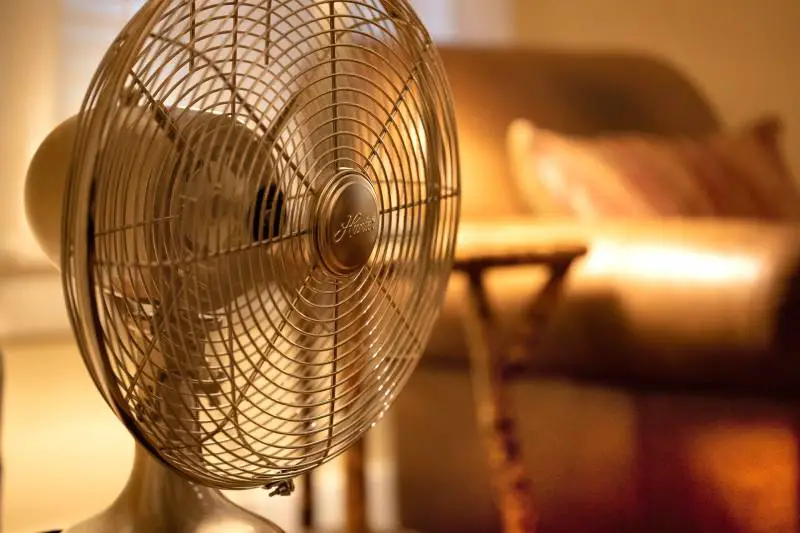Table of Contents
Pedestal and standing fans offer pleasant cooling and constant airflow both indoors and outdoors.
These high-velocity ground fans have heavy-duty stands or statues that are frequently height adjustable to provide cooling in various configurations.

They are much more convenient and helpful in moving air around the home. Although they are much more convenient and useful in moving air, they may sometimes have an irritating noise common in most fans.
Do you want to know the common causes of noise in standing fans? Continue reading this article. We have highlighted some of the common reasons that may lead your standing fan to make noise and how to fix them.
Causes of Noisy Fan and Easy Tips to Fix It
If you are asking yourself, “Why is my standing fan making noise?” Here are some potential reasons.
Dust Particles
After a long period of usage, table fans tend to collect dust and debris.
This build-up may cause your fan to make strange jittering noises and hinder its overall performance. Fortunately, this fix is simple and doesn’t require the use of a screwdriver; all you’ll need is a damp washcloth and your own hands.
After every two weeks of use, clean a fan using a crevice-cleaning adaptor. During the summer, use a moist cloth to scrub debris from the blades at least twice.
Weak or Poor Fan Blade
Fan blade that is too weak or poor quality fan blade on your pedestal fan is another common cause.
Fan blades that are too narrow don’t cover the full attic or the region in front of the outlet. If there are any gaps, condensation and humidity will seep into your heat exchanger and ceiling, causing damage to your heating system and roof.
The great news is that your standing fan may be easily replaced with new fan blades. They are frequently sold as part of a package deal with your central air conditioner.
Make sure the blades are changed regularly. Replace them as soon as you detect the engine moving slowly or the edges beginning to make noise. A faulty motor will end up burning out, causing your air conditioning system to shut off.
Dimmers
If your ceiling fan makes a whirring sound, you’re dealing with a more common type of annoying ceiling fan sounds.
A whirring noise may not always be apparent during the day, but if you are using your fan to try to sleep at night, it can be very noticeable and bothersome. Among the most common causes of a humming ceiling fan are dimmable controls to change the fan speed.
Ceiling fans weren’t really designed to work with dimmers. Because this is not the proper way to set the fan’s velocity, you may experience a buzzing noise. It would help if you used the default speed controls instead of dimmers.
Defective Screws
Faulty screws could cause your tower fan’s creaking noise. If the screws connecting the fan blades to the engine are slack, tighten them.
Ceiling fan blades with unsecured screws could put your family at risk. A faulty fan blade can cause damage to your home or injure relatives. While you’re there, double-check that the rotor housing has no loosened bolts. All screws should be tight but not too tight.
Wire connections within the switch housing might potentially generate a whirring sound. With the primary power turned off, make sure all wire connections are snug and not squeaking by rolling against one another or the inside of the switch housing.
Ceiling fans that produce a lot of noise might be a misery to live with.
Discover why the fan is creating noise as the first step in resolving the issue. You can either hire a skilled specialist to fix the problem for you – or play detective and figure it out yourself.

How to Fix A Standing Fan?
Use a standing fan with a compressor that is powered by the same engine and runs at the same velocity as your cooling system.
This is the most straightforward strategy to ensure that the stationary fan blades always spin at maximum speed. A weak or slow-rotating fan blade may start to create noise after a little while, which is a concern.
If you’re using the motor that drives your standard fan, this will not happen. Spare blades for your standing fan should be easy to come by.
If you have more than one table fan, make sure you connect them correctly. You can often get away by connecting one pedestal fan to an air conditioning unit.
But make sure you connect each fan to its thermostat. Otherwise, the air in your room will become stale and humid. Table fans are great because you can move them around quite a bit.
But, if they are connected improperly, you could cause them to become damaged.
Check Your Electrical Motor
You can check your electrical motor to make sure that it isn’t a problem. Many times this will clear up itself with time.
If your air conditioner has trouble cooling down the area where your fan is located, the problem could be with the electrical motor.
A small motor may just be overheating and causing the area to overheat. This will eventually burn out the entire fan, and the area surrounding it will start to get very cold.
This is a common problem with older fans and may not be related to your fan at all.
Have It Checked by an Expert
If you aren’t getting the results you want from your standing fan, consider having it serviced. You can take it to a local HVAC service center and have someone check the motor and replace any damaged parts.
Or, you could have your fan serviced by you to determine what exactly is wrong. Knowing why is my standing fan making noise can help you troubleshoot the situation and figure out whether it needs repairs or maintenance.
Keep in Mind
While the cause of the noise may be simple and you may be able to take care of it yourself, you should still take action. Always remember to turn off the power before attempting to repair the issue.
Also, if the noise is coming from something you can’t reach, like the ceiling, make sure you don’t try to open it because it may damage the fan further.
Having your fan serviced professionally will ensure you get the best results, no matter what caused the noise in the first place.
There are many more things that you can do to prevent your standing fan from making noise, including changing the air filter regularly.
If you have pets, you should also consider having them serviced regularly, especially if they are aggressive chewers. Also, check the UL sticker on your fan.
If it doesn’t comply, it is probably time for a replacement.
Final Remarks
When you are looking for a fan, you should always take into account the purpose of the model. If you are looking for a standing fan, you don’t need to worry about its noise.
However, if you are looking for a humidifier or other air conditioning unit, you should definitely look for quieter models.
Still, have more concerns about standing fan or table fan? Do not hesitate to contact us.
